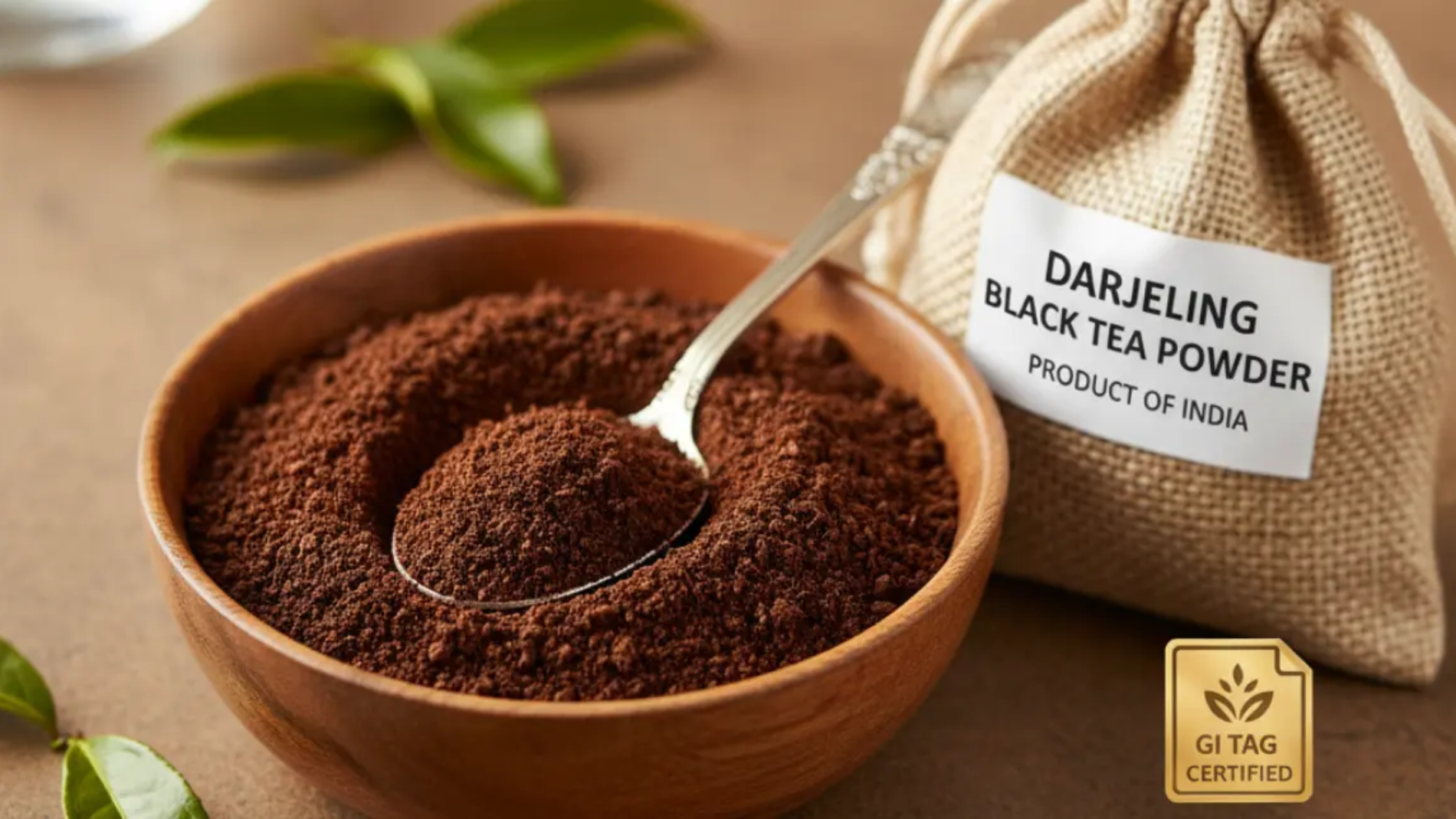In the vast and storied world of tea, one name stands apart, whispered with a reverence usually reserved for the finest wines: Darjeeling. Hailed globally as the “Champagne of Teas,” its reputation for complexity, delicacy, and unparalleled quality is legendary. While traditionally enjoyed as a loose-leaf brew, the evolution of this treasure into a fine powder has unlocked new possibilities for its use.
But what is it that makes Indian Darjeeling Black Tea Powder so exclusive? The answer is not a single factor, but a magical confluence of geography, nature, and human craftsmanship. From our perspective in Pune, at the heart of the Indian trade, we’ll explore the pillars that uphold Darjeeling’s prestigious status.
A Unique Terroir: The Himalayan Advantage
The story of Darjeeling’s exclusivity begins with its irreplaceable home. True Darjeeling tea is grown only on 87 designated Darjeeling tea estates in the steep, misty foothills of the Himalayas in West Bengal. This unique environment, or terroir, cannot be replicated anywhere else on earth.
High Altitude: Cultivated at elevations between 600 and 2,000 meters, the tea bushes (Camellia sinensis) endure cool temperatures and slow growth. This leisurely pace concentrates the aromatic compounds in the leaves, creating a more complex and nuanced flavour.
Misty Climate: The constant interplay of sun, clouds, and cool mountain mist puts the tea plants under a gentle stress, compelling them to produce more flavourful oils as a natural defense.
Soil and Drainage: The steep, well-drained slopes and acidic soil are perfect for this specific tea varietal, contributing to its final, sophisticated taste profile.
Spice Up Your Business with Authentic Indian Flavors
Import and Export Excellence from India!

The Art of the Flush: Capturing the Seasons
Unlike teas from other regions, the character of Darjeeling changes dramatically with the seasons. Each harvest, known as a “flush,” tells the story of the weather and time of year it was grown in.
First Flush (Spring): Harvested from March to April, these are the first tender new leaves after the plant’s winter dormancy. A first flush tea is light, vibrant, floral, and has a clean, pleasant astringency.
Second Flush (Summer): Plucked from May to June, these leaves have matured under the summer sun. This is the most prized harvest, renowned for developing the iconic muscatel flavor—a unique, complex, fruity note reminiscent of muscat grapes.
This seasonal variation makes each flush a limited-edition product, adding to its rarity and exclusivity.
The Mark of Authenticity: The Protected GI Tag
With global fame comes the threat of imitation. To protect its priceless legacy, Darjeeling tea was one of India’s first products to be awarded a Geographical Indication (GI tag). This is a legal protection, recognized internationally, that functions like the Appellation d’Origine Contrôlée for French Champagne.
The GI tag is an importer’s and consumer’s ultimate guarantee. It certifies that the tea was grown, harvested, and processed only within the defined boundaries of those 87 official estates, adhering to the strict standards set by the Tea Board of India. When sourcing a product with this certification, you can be 100% confident you are getting authentic Indian Darjeeling Black Tea Powder.
From Leaf to Powder: Making Exclusivity Accessible
The transformation of this exclusive leaf into a fine powder is a modern innovation that makes its unique qualities accessible to a wider range of applications. For luxury food and beverage brands, this is a game-changer.
A high-quality Indian Darjeeling Black Tea Powder allows for the infusion of this prestigious flavour into products where loose leaves are impractical:
Gourmet ice creams and sorbets.
Artisanal chocolates and confectionery.
High-end bakery mixes and desserts.
Premium ready-to-drink (RTD) beverages and lattes.
It allows a brand to instantly elevate a product by associating it with one of the most luxurious ingredients in the world.
In conclusion, the exclusivity of Darjeeling is not a marketing gimmick. It is the genuine result of a unique place, a dynamic climate, a protected heritage, and a flavour that simply cannot be found anywhere else.
Spice Up Your Business with Authentic Indian Flavors
Import and Export Excellence from India!

Frequently Asked Questions (FAQs)
1. What does the “muscatel flavor” of Darjeeling tea actually taste like?
It’s a complex, sweet, and fruity note unique to Second Flush Darjeeling. It is often compared to the taste of muscat grapes, with hints of apricot, almond, and a pleasant, lingering finish.
2. Is Darjeeling black tea bitter?
No, a high-quality Darjeeling, brewed correctly, is not bitter. It has a pleasant astringency (a brisk, mouth-drying sensation), which is a sign of quality, but it should be smooth and floral, not harsh.
3. How can I verify the GI tag of a Darjeeling tea supplier?
A reputable supplier should be registered with the Tea Board of India and be able to provide certification and batch details that trace the tea back to one of the 87 registered Darjeeling tea estates.
4. Is Darjeeling tea powder good for making a traditional milk tea or chai?
Generally, no. The flavour of Darjeeling is very delicate and nuanced. It is best enjoyed on its own or with a touch of sweetener. The bold, malty flavour of an Assam CTC tea is much better suited for standing up to milk and spices.
5. How is the powder different from loose-leaf Darjeeling?
The powder offers the same flavour profile but in a format that is instantly soluble and easy to incorporate into recipes. It provides convenience and versatility for manufacturing, whereas loose-leaf is intended for traditional brewing.
6. Does Darjeeling black tea have health benefits?
Yes, like other black teas, it is rich in antioxidants (theaflavins and thearubigins) which are known to support heart health and overall wellness.
7. Why is Darjeeling so much more expensive than other Indian teas?
Its high price is due to several factors: the limited production area (only 87 estates), the difficult mountainous terrain, the meticulous harvesting and processing required, and its immense global demand.
8. Can I get organic Darjeeling black tea powder?
Yes, many of the most esteemed Darjeeling estates are certified organic. Sourcing an organic variety is an excellent way to ensure the purest expression of the region’s unique terroir.
About us
We bridge the gap between local producers and global markets, ensuring seamless trade facilitation with exceptional quality and reliability. We provide quick delivery services with customized packaging with all approval of International Certificates (Spices board India, MSME, IEC, fssai, FIEO, APEDA, EU certification, FDA and Many More)
Contact us
Shop No. 3, Ganesh Prestige Sr. No. 2/15, Near Laxmi Jewellers, Dhanakawadi, Pune – 411043, Maharashtra INDIA.
Call On
+91 9545205050
+91 9822422584



Leave A Comment